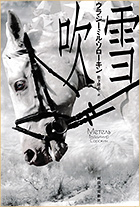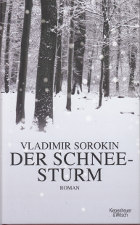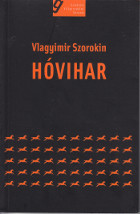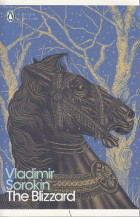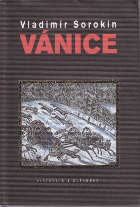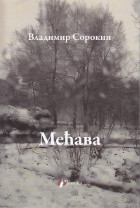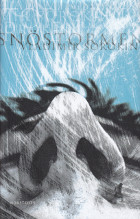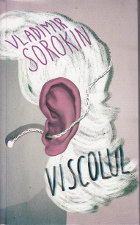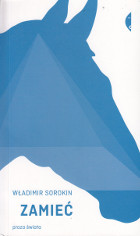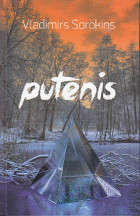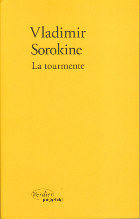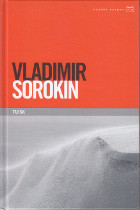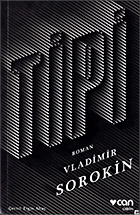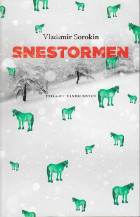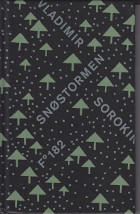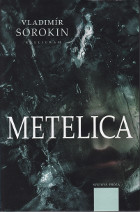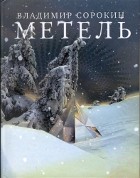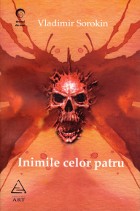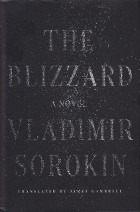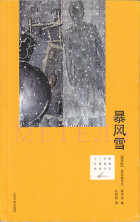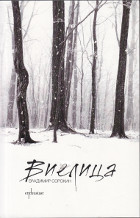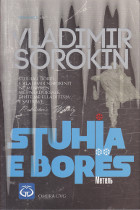Vladimir Sorokin
The Blizzard
Proposal
Published by
- AST publishers, Moscow
- Pistorius, Czech Republik
- Verdier, Paris
- Kiepenheuer & Witsch, Cologne
- Curtea Veche, Bucharest
- Norstedts, Stockholm
- Czarne, Poland
- Farrar, Straus and Giroux, New York
- Gondolat Kiadó, Budapest
- Vandkunsten, Denmark
- Kalligram, Bratislava
- Enthusiast (Alto), Bulgaria
- Tänapäev, Estonia
- Flamme, Oslo
- Bata press milenium, Macedonia
- J.L.V. publishers, Riga
- Bompiani, Italy
- Fraktura, Croatia
- Ombra, Albania
- Intelekti Publishers, Georgia
- Can Sanat Yayinlari, Turkey
- Penguin Classics, London
- Bazarov Edições Lda., Portugal
- Locus Publishing House, Israel
- Geopoetka, Serbia (rights have reverted)
- Kawade Shobo Shinsha, Japan
„˜The Blizzard not only tells of states of intoxication – reading the novel becomes intoxicating in itself. And this work is more Russian than ever, the soul is laid bare. You don’t read this bewitchingly beautiful, profound and ruthlessly critical book in small doses, you read it in one go.“ Die Welt, 11.08.2012
„His new novel not only evokes all of Russian literary history in its title, but also in the way it is told, and in its style. … He is a brilliant stylist, who feels Russian literature quite physically. If he calls out the first guard of Russian authors, he can claim a decisive advantage for himself: they are dead, but he is alive. Their works outline a landscape of meaning that is both familiar and outdated, which Sorokin sweeps away mercilessly with his text.“ Neue Züricher Zeitung, 19.12.2012
„In ‚˜The Blizzard‘, Sorokin depicts the fantastic and gloomy future vision of a Russia that may be highly advanced technologically, but that is socially as barbaric and backward as a feudal state in the Middle Ages. … With the richly suggestive story of a rescue mission that gets hopelessly trapped in the snow, Sorokin once more describes a thoroughly sinister anti-utopia. And precisely because the author largely rejects provocative shocking images this time, you take all the more interest in the fate of his two unhappy travelers.“ Deutschlandradio 30.11.2012
„Sorokin, the master of postmodernist writing in Russian, tells this story in a very classical tone. But he mixes Russian topoi of the past such as the coach ride, the devoted driver or the archaic conditions in villages with elements of fantastic literature that are worthy of a Lovecraft. It soon becomes clear that a future post-apocalyptic Russia is being described: as a dystopia, in which mutations and infections call into question the understanding of humanity, just as merciless isolation, in a land where all social cohesion seems to have broken down, has done with morality. This novel has only become more relevant since Putin’s re-election as president.“ Frankfurter Allgemeine Zeitung, 07.08.2012
„Vladimir Sorokin is undoubtedly one of the greatest contemporary writers in Russia. With ‚˜The Blizzard‘, he quite consciously and deservedly joins the ranks of his great predecessors, and at the same time tells a captivating, snow-flake enchanted parable of the state of Russia today – and perhaps in the future as well.“ Bayerischer Rundfunk, 10.10.2012
„‚The Blizzard‘ has a very complex and deep structure, despite the simple story. It is like a lyrical landscape painting about the loss of human longings and their social feedback. But this philosophical and political topic is treated in compelling prose. This is certainly one of Vladimir Sorokin’s best books.“ Der Freitag, 13.09.2012
„And from up ahead the endless, boundless field
crawls up, as if there were nothing else in the world,
only these poor shrubs and scraps of weed.”
Right from the beginning the reader is immersed in the atmosphere of the 18th or 19th century, in a quiet narrative, as is typical for the Russian classics. District doctor Garin, 42, is a man with a „narrow, elongated face with a large nose, shaved until it is blue and always bearing an expression of concentrated dissatisfaction: you are constantly preventing me from doing the only thing that is important and possible for me, the thing fate has chosen me, which I can do better than all of you and on which I have already spent most of my conscious life.“ Come what may, Garin must reach the village of Dolgoye, where a mysterious epidemic is raging – the „Chernukha“ – which was has been introduced from Bolivia, threatens to spread throughout Russia, and which turns people into zombies. In his travel bag he carries a vaccine that will prevent the spread of this terrible disease. But for several days it has been snowing constantly. Garin’s horses are exhausted, and there is no change of horses at the posting station. A quiet little fellow called Perkhusha, who usually takes the bread out, is prepared to carry him on his „scooter“, drawn by fifty horses – or does he mean a weak fifty horsepower?
The reader soon loses his bearings. Strange things thrust their way into the patriarchal image: a telephone, a box with „touching“ images (i.e. images that can be touched), a Chinese teapot talking easily with a Russian stove, and a Kalashnikov with ancient tapestries and a moonshine distilling unit whose absence would be unthinkable in Russia. A portrait of the land owner and his two daughters hangs on the wall in a rainbow-colored, inextinguishable light frame. But the blizzard and the inaccessibility of Russia, the good-natured but dim-witted Russian fellow and the no less stupid member of the Russian intelligentsia, who has set his mind on bringing the vaccine as quickly as possible to its destination to save the human race, have not changed in the past centuries. Nor have the conversations between the member of the Russian intelligentsia and the people.
The doctor tries to find out from Perkhusha what the most important thing in life is for him, and he gets an answer completely in the spirit of Tolstoy’s Platon Karataev: „Now that the horses are keeping healthy, I’ve got enough for me to buy bread… and I myself also, that I am without a disability.”
„And what would you change in your life?“ „In my life? Oh, nothing. I’m content.”
„And what about in life in general?“
„In general?“ Perkhusha scratched his forehead with his sleeve. „Fewer bad people. Yes, that’s about it.“
It is only 17 versts to Dolgoye, but the few hours‘ drive turns into days (and finally eternity). Time and again, the blizzard forces the passengers to stop for the night. They stay with a tiny miller and his dissolute wife. Then they warm up with the „Vitaminese,“ an Asian clan of drug dealers, and Garin tries a new drug in a tent, pyramid, which puts him into a strange state – a journey through time into the Russian unconscious or into a new reality? He thinks he is suddenly in a huge square with hundreds of people. Everyone stares at him as he cowers tied up in a giant cauldron in which oil is slowly heated. „He starts to cry and protest his innocence. He talks about a terrible mistake…. He becomes aware that he is swallowing the oil… He vomits the oil into the oil. The crowd laughs. He concentrates. He calms down. He speaks to the crowd… He talks about his life… He wanted to do good and bring good to the people. He’s sorry for what he’s done. He spoke disparagingly of those in power. He wished that Russia would sink into Hades. He ridiculed the Russian people. He ridiculed the ruler. But he is not a criminal. He has always respected the laws. He has always paid his taxes… He talks about faith… two thousand years have passed since the death of Christ, but people have still not yet learned to love each other… they have not stopped hating, cheating and stealing from each other. People have not stopped killing one another. Then the soles of his feet get hot. He pushes himself by the handles of the cauldron and back into the oil. Pushes himself out and falls in. Pushes himself out and falls in… He leaps around in the oil.“
When he comes back to his senses, the doctor realizes that this is the best drug he has ever taken. „With pyramid you discover life anew. After pyramid you don’t just want to live, but to live as if it were the first and last time, you wanted to sing the joyous hymn of life.“ The endless snowy plain and even every snowflake seem a miracle to him and make him happy to be alive. But once the high dies down, he is suffering again from the cold, the inaccessibility of the country, and the absurdity of Russian life.
The reader is curious to learn about the mysterious virus that wakes the dead and turns them into Zombies. But expectations of a horror thriller will be disappointed, because the „genre“ of this novel is the Russian grotesque. Only three miles away from Dolgoye the „scooter“ has got lost in the nostrils of a dead giant who has drunk a three-bucket-sized container of moonshine and has fallen asleep right on the street. Nearby the doctor comes across the giant’s most recent work – a giant snowman with an enormous reproductive organ made from a tree, which towers menacingly „with steadfast willingness to penetrate the world around him with his phallus.” Welcome to Russia.
The journey does not lead to a goal. The doctor gets caught by Chinese. The driver freezes and as he fades away dreams of the magic larva of a large blue „death’s head hawkmoth,“ which he wants to save from a burning hut. But the cocoon of the larva bursts, and an incredibly beautiful moth arises, which bears an angel’s face on its back. Perkhusha reaches for the velvety legs of the moth, which carries him out through the burning window. A nod to Nabokov?
It’s not by chance that Sorokin has called his new novel „The Blizzard“. It is hard to find a Russian writer who has not left something behind on this subject. In Pushkin’s „The Blizzard“ the protagonist, waiting for her bridegroom who is lost in the snow, marries by accident a man whose name she does not even know. Sorokin’s novel is linked to Lev Tolstoy’s „The Snowstorm“ by its detailed description of the cold and driving snow. One is also reminded of the snow storm in Leskov or Alexander Blok, where twelve apostolic Red Army soldiers walk through a blizzard towards a bright future, and „To the wreath of white roses / And full of gentleness each step, / Jesus Christ walks alongside.“ But where are they all walking or riding? To their destruction! So it is with everything in Russia. And everything is covered by snow, which puts you to sleep and prevents movement that would end in disaster.
Unlike „The day of the Oprichnik“, „The Blizzard“ is a kind of lullaby: „This genre fits our reality better than any other, far removed as it is from epics and hymns. The text flows evenly along as if it were gliding on runners along a trodden path. The lullaby lulls one and gives no answer to the question of whether there will be an awakening. The epigraph, the quote from Blok, ‚On a white bed / the dead man lies down / and before the window once more / snow blows into a storm‘ does not leave much room for doubt.”(Afisha)
„This is obviously a retrospective Sorokin: Of all his works, „The Blizzard“ is closest to his novel „The Novel“, which he wrote in the eighties. The story is once again frozen, as if it had never occurred in Russia: five generations after Stalin, portraits of the ruler and his two daughters are once again hanging on the walls, and in the village it is like at Gleb Uspensky, where a demon leads us around in a circle.“ (Gazeta.ru)
